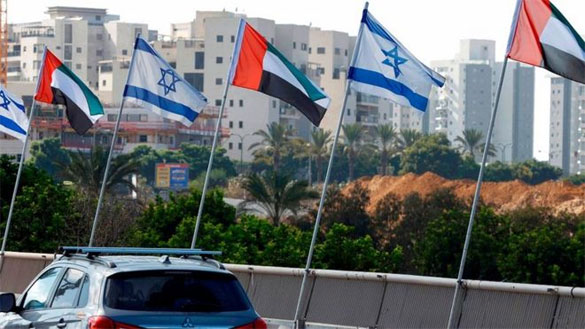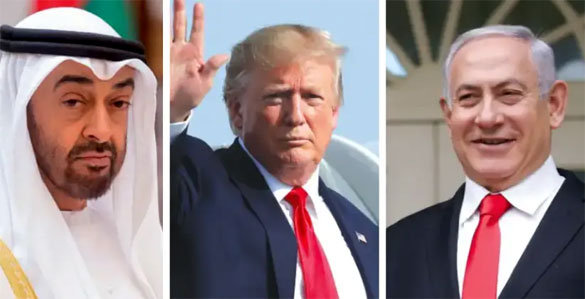
By Prof. Akhtarul Wasey, Tr. New Age Islam
(Translated by New Age Islam Edit Bureau)
17 October 2020
Israel–UAE normalization agreement, officially called the ‘Abraham Accords’ have elicited mixed responses from the global Muslim community with the majority of them feeling disheartened. They argue that at a critical juncture of unceasing human rights violations of the Palestinians at the hands of the Israeli forces, the peace overture from the UAE and Bahrain was uncalled for.

However, if we look into the shifting historical dynamics of the Palestine-Israel issue, there seems to be no sense of permanence in this age-old conflict ridden with international geopolitics and diplomatic dimensions. Since the establishment of Israel in 1948, the majority of Arab countries have never accepted Israel’s statehood. However, Egypt in 1978 and Jordan in 1994 gave a nod to the existence of Israel in a bid to pursue their mutual diplomatic and economic interests. Thus, the conflict has remained a rather complex and constantly changing issue in the broader Muslim imagination but it cannot be seen in a historical vacuum.
Viewed from a historical perspective, the cordial relations between Jews and Arabs can be traced back to the advent of Islam. In later periods, especially under the Abbasid Caliphate, Jews thrived and flourished without confrontation from the Muslim rulers and jurists. Jews as well as Christians wielded great influence on the cultural affairs in the Caliphate, especially in Baghdad. Some Abbasid Caliphs showed wider embrace and great recognition to the Jewish scholars for their scriptural knowledge and wisdom and manifold intellectual contributions that ushered in Islam's Golden Age. Notably, during the reign of Caliph Al-Mansur (714–775)—the third caliphate to succeed Prophet Muhammad (PBUH)— Jews and Christians actively engaged in Islam’s academic pursuits and influenced the Muslim way of performing death funeral (Janaza). Most significantly, the Caliph of Baghdad laid the very first stone for the foundation of the city as the capital of his caliphate with an input from his advisors including a Jewish astrologer. Later, Caliph Al-Mutawakkil (822–861) and Al-Muqtadir (908–932) also followed a similar policy in their treatment with Jews and Christians in their territories. They recruited Christians as secretaries, and non-Muslims including Jews had access to the most prominent positions within the dynasty.

An opening toward negotiations or peace agreements between the leaders within Israel and Palestine came with Yasser Arafat, the then Palestinian leader and chairman of the Palestine Liberation Organization. He was the first to realize that the establishment of Palestinian state was not possible with only forceful resistance. Subsequently, he initiated normalization negotiations and proposed the idea of a two-state formula with Israeli leaders in Oslo. Arafat proposed to offer olives, in place of military arms to move forward towards the desired peace. Nevertheless, the Oslo talks were no more than an overture to a long debate, which miserably failed to establish an independent Palestinian state. Concomitantly, Israel’s continuous tenacity emboldened by the United Nations’ indifference to the human indignities of the Palestinians. The Palestine Liberation Organization carried forward the legacy of Yasser Arafat even after him under the leadership of Mahmood Abbas. In the meantime, the US and its allies declared Jerusalem as the capital of Israel and thus added fuel to fire in the Palestine crisis.
Now, the UAE and Bahrain with their peace overture convey the message that the Arabs are now guided by the principles of pacifism and a radically new non-violence policy. In their bid to maintain peaceful diplomatic alliances with Israel, they are read to cut off from the majority of Muslim world who do not extend open or tacit support. It was the time Israel showed the similar large-heartedness and a more responsible and humane attitude towards the persecuted Palestinians.
First and foremost, Israel should take initiative to return all illegally captured and forcibly occupied lands since 1967 to Palestinians and Jerusalem should be restored to the situation as earlier. At the same time, we should not forget King Salman’s underlying statement that Saudi Arabia will not forge an alliance with Israel unless the legal rights of Palestinians are accorded to them. Only then the Abraham Accords will be viewed as a genuine effort towards mutual reconciliation. Without Saudi Arabia, Israel would not be able to enjoy the support from the Islamic world fraternity because King Salman is not only the ruler of Saudi Arabia but also the custodian of the two holiest sites in Islam—Makkah and Madinah—and thus he holds the central position for Muslims around the world.
We also understand that the 21st century Saudi Arabia is on the cusp of change, and is heading towards new economic, educational and cultural reshape. The Arabs of the 21st century are no longer the Saudis of the 20th century. Emotions and aspirations of the new Arab generation are completely different from their predecessors. Therefore, the Saudis have adapted themselves to the modernity that has taken place over a period of time in its immediate neighbourhood; Abu Dhabi, Dubai, Doha and Muscat. One of the encouraging news emanating from the gulf is that even Qatar is not at the loggerheads with Saudi Arabia with regards to the agreements with Israel. After a long time, Qatar and Saudi Arabia are agreeing upon an issue of mutual interest. It was about time that Turkey and Iran also gave some thought to it.
In all likelihood, the future course of politics in the Gulf countries will face a crucial phase. Since the UAE and Bahrain do not share borders with Israel, therefore, the case now will not turn out to be similar to Egypt and Jordan. If they remain true to their words, the stabilization agreement will continue to bear fruits. Or else, it will only reinforce the stand of Turkey and Iran in the Muslim world and regional and international support for Palestinians will be amplified.
Without a doubt, it is an uphill decision taken by the UAE and Bahrain to forge diplomatic alliances with Israel, but it seems rather more daunting challenge for Israel because if it fails in the agreement, a far more vociferous global outcry will humiliate it on international platforms. However, UAE and Bahrain are likely to be exonerated of any accusations because they will cite the precedent of Israel cheating on Jordan and Egypt. I personally request King Salman to play a leading role in maintaining peace and stability in the Gulf while at the same time safeguarding the rights of Palestinians. Global peace is ruled out unless there is stability, security and harmony in the Middle East. In this context, the Abraham Accords are indeed a welcome change in the positive direction, but only if you do not give Israel an 'open pass'. No peace agreement is open-ended.
------
Professor Akhtarul Wasey is Professor Emeritus in Islamic Studies at Jamia Millia Islamia, New Delhi and President, Maulana Azad University, Jodhpur
The original article was published in Urdu daily, Inquilab.
New Age Islam, Islam Online, Islamic Website, African Muslim News, Arab World News, South Asia News, Indian Muslim News, World Muslim News, Women in Islam, Islamic Feminism, Arab Women, Women In Arab, Islamophobia in America, Muslim Women in West, Islam Women and Feminism




 Moderate Islamist here
Moderate Islamist here


0 comments:
Post a Comment